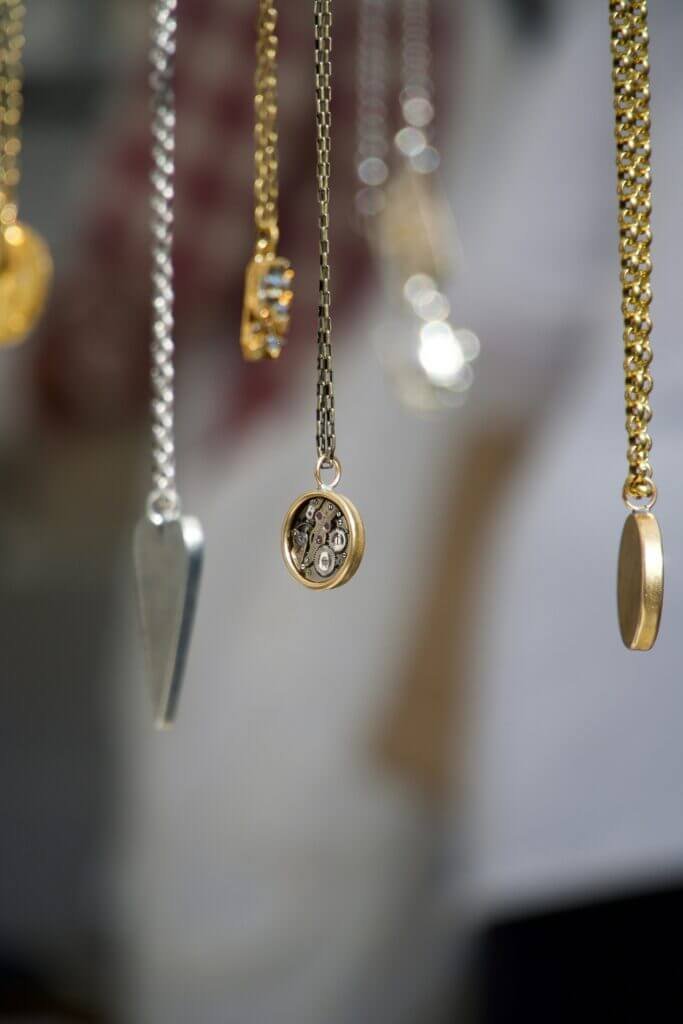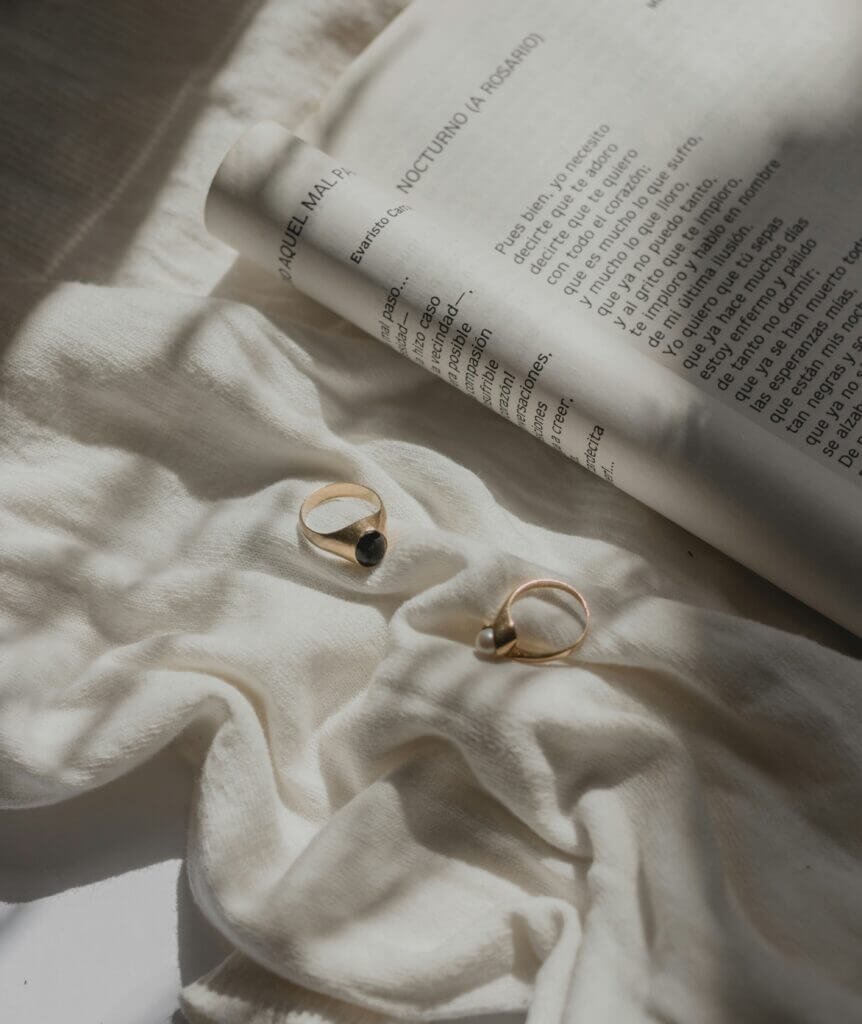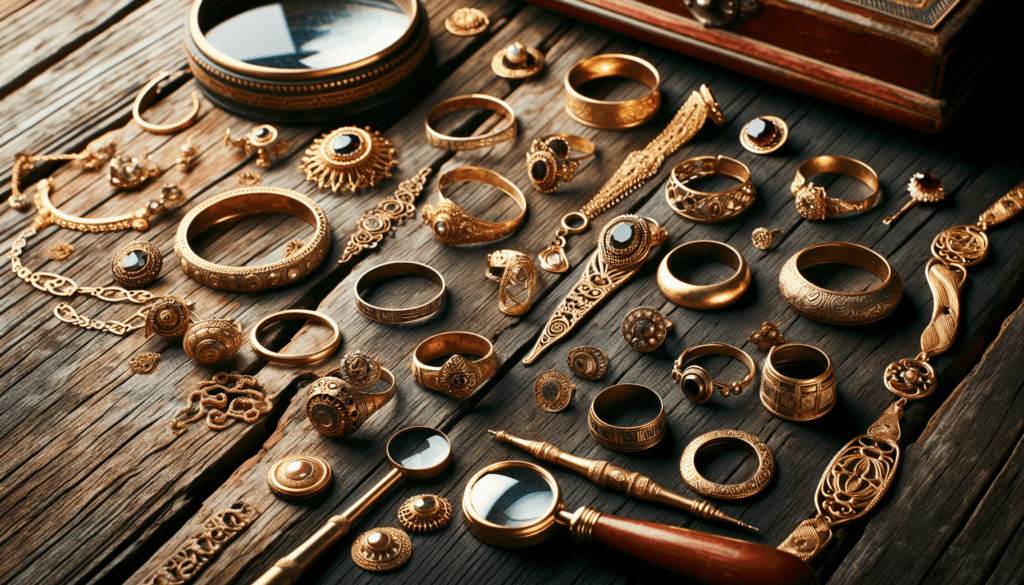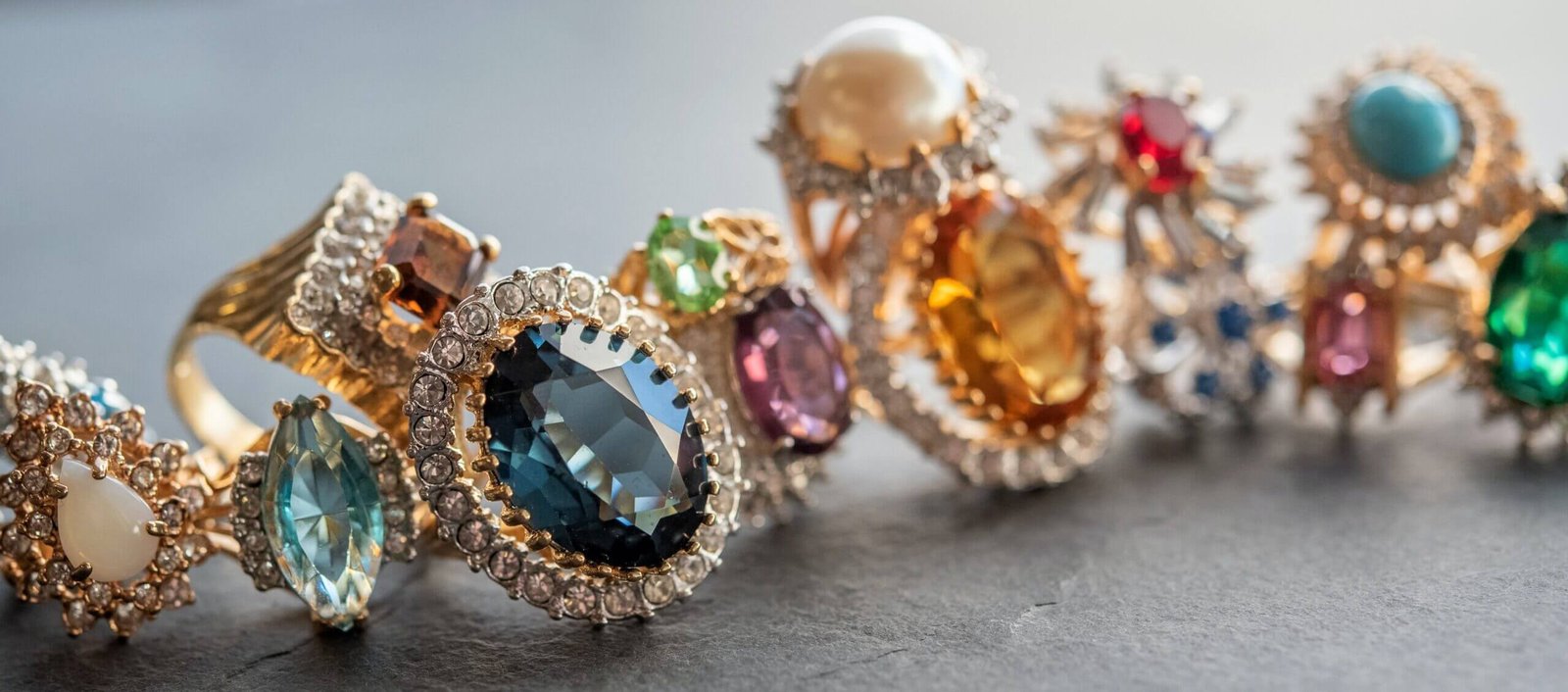If you’ve ever had the pleasure of sifting through vintage gold jewelry, you might have noticed peculiar stamps or markings. Relax and get comfy as we embark on a fascinating exploration of these intricate marks, which tilt the window into an otherwise hidden world of goldsmiths, metallurgy, and historical periods. In this article, we’ll help you decode what these markings on vintage gold jewelry are, their importance, and the story they can tell about the piece’s ancestry. You will unlock the secret language of jewelry marks, from purity stamps to maker’s marks, letting you appreciate your vintage treasures on a whole new level. So, whether you’re a passionate collector, a casual lover of vintage fashion, or someone who simply stumbled upon old family heirlooms, your journey into this intricate code starts right here!

Understanding Vintage Gold Jewelry
Vintage gold jewelry has always held a special place in the hearts of many fashion enthusiasts and collectors. This is more than just a reflection of its timeless elegance and charm, but is also connected to the richness of the stories each piece carries with it.
Defining ‘Vintage’
So, what does ‘vintage’ actually mean? Typically, a piece of jewelry is considered ‘vintage’ if it was made between 20 to 100 years ago. Anything older than that falls into the ‘antique’ category. ‘Vintage’ also refers to pieces that are representative of certain periods in history, characterized by distinct styles, trends, and craftsmanship.
The allure of Vintage Gold Jewelry
As to why vintage gold jewelry is highly sought after, it’s largely due to the craftsmanship, uniqueness, and history they convey. Vintage gold pieces were often meticulously handcrafted, unlike the mass-produced jewelry of today. Besides their exquisite beauty and rareness, vintage gold jewelry also offers a tangible connection to the past, which many people find fascinating and desirable.
Understanding Hallmarks
Hallmarks are a key element of vintage gold jewelry. They’re small markings or stamps usually found on the back, inside or bottom of a jewelry piece.
What is a Hallmark?
A hallmark is a stamp imprinted on a piece of gold jewelry by the manufacturer to vouch for its authenticity and quality, effectively serving as a guarantor’s mark.
The Importance of Hallmarks
Hallmarks are more than just symbols; they hold important information about the piece, including its purity, place of origin, and maker. They not only authenticate the piece but also offer valuable knowledge about the history behind it.

Types of Markings on Vintage Gold Jewelry
There are generally three types of markings you’ll find on vintage gold jewelry: hallmarks, maker’s marks, and purity marks.
Hallmarks
As mentioned earlier, hallmarks are imprints providing essential information such as purity and provenance of the piece.
Maker’s Marks
Maker’s marks are similar to hallmarks, but instead of indicating the piece’s quality or origin, they signify who made it. This can be the individual craftsman or the company that produced the item.
Purity Marks
Purity marks, also known as fineness marks, indicate the actual gold content within the piece. This is expressed in karats (K) in the United States and parts per thousand internationally.
Reading Hallmarks on Vintage Gold Jewelry
Deciphering hallmarks can feel like reading a secret code, but with a little practice, it can be rather enlightening.
Common Types of Hallmarks
Common types of hallmarks include symbols for the country of origin, the maker of the piece, the year it was made, and the purity of the metal.
Interpreting Hallmarks
Interpreting hallmarks requires a bit of knowledge and research. You may need reference books or online research to understand and recognize these marks. This may take time initially, but once you get the hang of it, you’ll find it deeply rewarding.

Reading Maker’s Marks on Vintage Gold Jewelry
Maker’s marks offer another layer of information and authenticity for vintage gold jewelry pieces.
What is a Maker’s Mark?
A maker’s mark is a unique stamp from the company or individual responsible for crafting the piece.
Common Makers’ Marks
Common maker’s marks might include unique logos, initials, or symbols and can typically be found in the same area as the hallmarks.
Reading Purity Marks on Vintage Gold Jewelry
Purity marks are integral in understanding the quality and value of vintage gold jewelry.
Understanding Gold Purity
Gold jewelry’s purity is gauged by its karatage, which is usually denoted in a simple number and letter format such as ’14K’ or ’24K’. This represents the proportion of pure gold to other metals in the composition, with 24K indicating pure gold.
Typical Purity Marks on Vintage Gold
Typical purity marks on vintage gold jewelry include ’10K’, ’14K’, ’18K’, ’22K’, and ’24K’ in the United States, whereas in many European countries, a three-digit number denotes this e.g., ‘375’ for 9K gold, ‘585’ for 14K gold, ‘750’ for 18K gold, and so forth.

Regional Differences in Jewelry Markings
Different regions around the world have different systems and traditions for hallmarking which can provide insight into a piece’s cultural and geographic origins.
European Markings
European markings often use numerical hallmarks to represent purity, such as ‘750’ for 18K gold. They may also feature specific symbols representing countries, specific cities, or even historical periods.
American Markings
American markings commonly use a karatage system to indicate gold purity and often include a maker’s mark.
Asian Markings
Asian markings vary greatly across regions but frequently include unique pictorial or character-symbols alongside purity markings. For instance, in China, you might see their traditional ‘chop mark’, along with the gold content.
How Vintage Gold Jewelry Markings Can Determine Value
Markings on vintage gold jewelry play a vital role in assessing its value.
Influence of Purity on Value
The higher the gold content (purity), the higher the intrinsic value of the piece.
The role of Maker’s Mark on Value
The reputation and rarity of the maker can significantly influence the piece’s value. Some well-respected or rare maker’s marks can increase the piece’s worth substantially.
How Hallmarks Contribute to Value
Hallmarks, by providing information about the piece’s origin and age, can increase its historical value and desirability among collectors.

Authenticating Vintage Gold Jewelry Using Markings
Using markings can be a useful way to authenticate vintage gold jewelry.
Professional Jewelry Authentication
Professional jewelers and appraisers are skilled in reading and interpreting jewelry markings, and they have the necessary equipment and knowledge to verify a piece’s authenticity.
Home Authentication Techniques
If you’re verifying at home, a magnifying glass is essential to see these small markings. You can also use the ‘acid test’ that involves using specific solutions to determine gold’s purity. However, these home methods aren’t foolproof, and professional verification is always recommended.
Maintenance and Preservation of Vintage Gold Jewelry
Taking care of your vintage gold jewelry can ensure its luster and value are preserved.
Tips for Cleaning Vintage Gold Jewelry
Regular gentle cleaning with mild soap and warm water using a soft cloth can keep your vintage gold jewelry sparkling. However, avoid using harsh chemicals as they might deteriorate the metal and gemstones.
Storing Vintage Gold Jewelry Safely
Store pieces separately to avoid scratching and tangling. Use a fabric-lined jewelry box, and for added protection, place each piece in a soft pouch or tissue paper.
Repairing and Restoring Vintage Gold Jewelry
Retain the services of a professional who is experienced in working with vintage jewelry if your piece requires repairing or restoring. The right expert can help you preserve the piece’s integrity and value. With proper care, your vintage gold jewelry can bring you joy for years to come, and become a treasured heirloom for future generations to appreciate.



